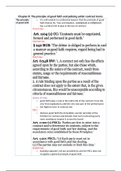Summary
Summary Chapter 8- the principle of good faith and policing unfair contract terms ISBN: 9781785368783 Comparative Contract Law (Law3011/2020-200)
- Course
- Institution
- Book
Chapter 8- the principle of good faith and policing unfair contract terms
[Show more]




